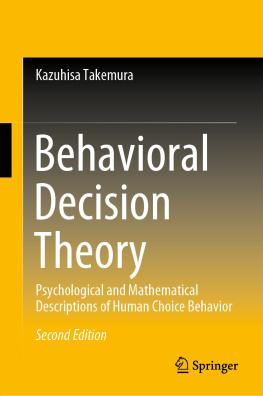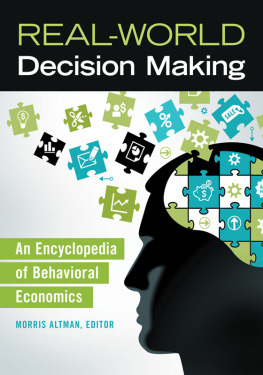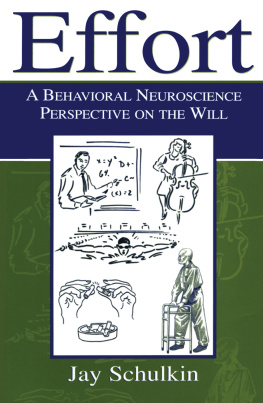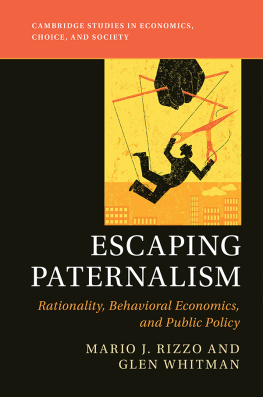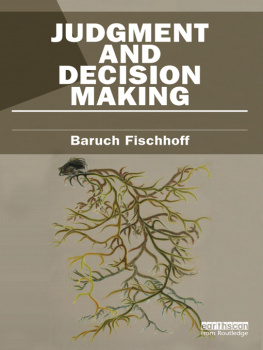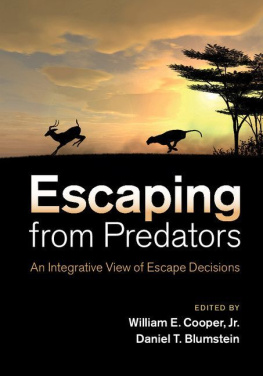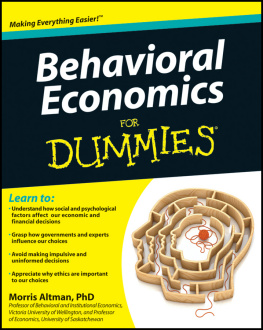Kazuhisa Takemura - Escaping from Bad Decisions A Behavioral Decision-Theoretic Perspective.
Here you can read online Kazuhisa Takemura - Escaping from Bad Decisions A Behavioral Decision-Theoretic Perspective. full text of the book (entire story) in english for free. Download pdf and epub, get meaning, cover and reviews about this ebook. City: San Diego, year: 2021, publisher: Elsevier Science & Technology, genre: Politics. Description of the work, (preface) as well as reviews are available. Best literature library LitArk.com created for fans of good reading and offers a wide selection of genres:
Romance novel
Science fiction
Adventure
Detective
Science
History
Home and family
Prose
Art
Politics
Computer
Non-fiction
Religion
Business
Children
Humor
Choose a favorite category and find really read worthwhile books. Enjoy immersion in the world of imagination, feel the emotions of the characters or learn something new for yourself, make an fascinating discovery.

- Book:Escaping from Bad Decisions A Behavioral Decision-Theoretic Perspective.
- Author:
- Publisher:Elsevier Science & Technology
- Genre:
- Year:2021
- City:San Diego
- Rating:4 / 5
- Favourites:Add to favourites
- Your mark:
- 80
- 1
- 2
- 3
- 4
- 5
Escaping from Bad Decisions A Behavioral Decision-Theoretic Perspective.: summary, description and annotation
We offer to read an annotation, description, summary or preface (depends on what the author of the book "Escaping from Bad Decisions A Behavioral Decision-Theoretic Perspective." wrote himself). If you haven't found the necessary information about the book — write in the comments, we will try to find it.
Kazuhisa Takemura: author's other books
Who wrote Escaping from Bad Decisions A Behavioral Decision-Theoretic Perspective.? Find out the surname, the name of the author of the book and a list of all author's works by series.
Escaping from Bad Decisions A Behavioral Decision-Theoretic Perspective. — read online for free the complete book (whole text) full work
Below is the text of the book, divided by pages. System saving the place of the last page read, allows you to conveniently read the book "Escaping from Bad Decisions A Behavioral Decision-Theoretic Perspective." online for free, without having to search again every time where you left off. Put a bookmark, and you can go to the page where you finished reading at any time.
Font size:
Interval:
Bookmark:
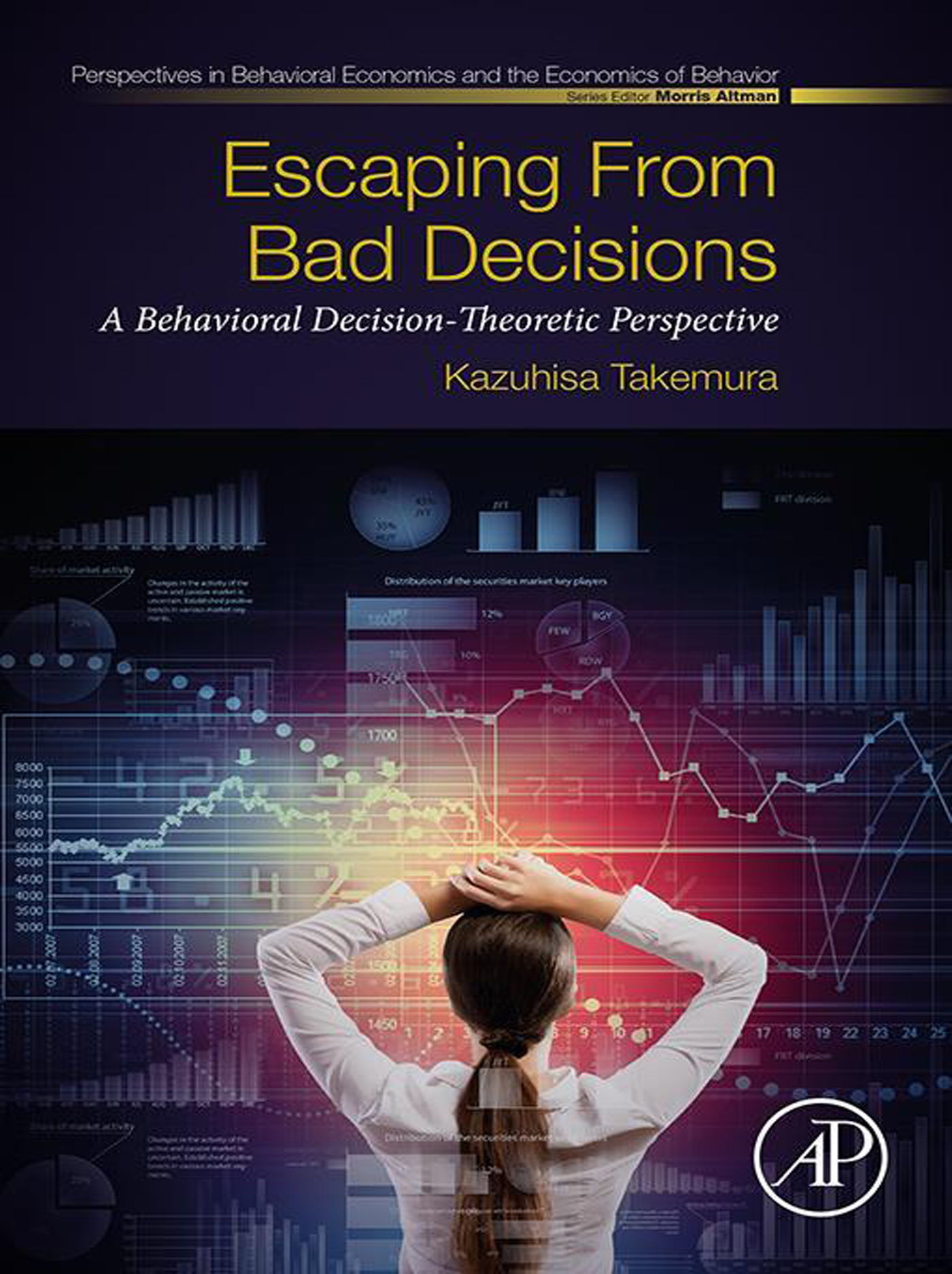
- Tables in 5
- Tables in 9
- Tables in 10
- Tables in 11
- Tables in 15
- Tables in 17
- Tables in 20
- Figures in 4
- Figures in 5
- Figures in 6
- Figures in 7
- Figures in 8
- Figures in 9
- Figures in 10
- Figures in 11
- Figures in 12
- Figures in 13
- Figures in 14
- Figures in 15
- Figures in 16
- Figures in 17
- Figures in 18
- Figures in 19
- Figures in 20
- Figures in 21
Kazuhisa Takemura
Department of Psychology & Center for Decision Research, Waseda University

Academic Press is an imprint of Elsevier
125 London Wall, London EC2Y 5AS, United Kingdom
525 B Street, Suite 1650, San Diego, CA 92101, United States
50 Hampshire Street, 5th Floor, Cambridge, MA 02139, United States
The Boulevard, Langford Lane, Kidlington, Oxford OX5 1GB, United Kingdom
Copyright 2021 Elsevier Inc. All rights reserved.
No part of this publication may be reproduced or transmitted in any form or by any means, electronic or mechanical, including photocopying, recording, or any information storage and retrieval system, without permission in writing from the publisher. Details on how to seek permission, further information about the Publishers permissions policies and our arrangements with organizations such as the Copyright Clearance Center and the Copyright Licensing Agency, can be found at our website: www.elsevier.com/permissions.
This book and the individual contributions contained in it are protected under copyright by the Publisher (other than as may be noted herein).
Notices
Knowledge and best practice in this field are constantly changing. As new research and experience broaden our understanding, changes in research methods, professional practices, or medical treatment may become necessary.
Practitioners and researchers must always rely on their own experience and knowledge in evaluating and using any information, methods, compounds, or experiments described herein. In using such information or methods they should be mindful of their own safety and the safety of others, including parties for whom they have a professional responsibility.
To the fullest extent of the law, neither the Publisher nor the authors, contributors, or editors, assume any liability for any injury and/or damage to persons or property as a matter of products liability, negligence or otherwise, or from any use or operation of any methods, products, instructions, or ideas contained in the material herein.
British Library Cataloguing-in-Publication Data
A catalogue record for this book is available from the British Library
Library of Congress Cataloging-in-Publication Data
A catalog record for this book is available from the Library of Congress
ISBN: 978-0-12-816032-9
For Information on all Academic Press publications visit our website at https://www.elsevier.com/books-and-journals
Publisher: Candice Janco
Acquisitions Editor: Brian Romer
Editorial Project Manager: Rachel Pomery
Production Project Manager: Surya Narayanan Jayachandran
Cover Designer: Matthew Limbert
Typeset by MPS Limited, Chennai, India

Kazuhisa Takemura is a Japanese psychologist and educator. Besides serving as a professor at the Department of Psychology, Waseda University, he is also the director of the Universitys Center for Decision Research, a professor at the Waseda MBA school, and a research fellow at the Waseda Research Institute for Science and Engineering.
He received his BA and MA degrees from the Department of Psychology, Doshisha University, in 1983 and 1985, and received his PhD (System Science) from Tokyo Institute of Technology in 1994, and an additional PhD (Medical Science) from Kitasato University in 2013.
He has also worked abroad as a visiting researcher at James Cook University, La Trobe University, and Australian National University (Australia); the Tinbergen Institute (the Netherlands); Gothenburg University and Stockholm University (Sweden); the University of Konstanz (Germany); and National Cheng Kung University (Taiwan). He was also a Fulbright Senior Researcher at the Department of Social and Decision Science, Carnegie Mellon University (USA) from 1999 to 2000, and a visiting professor at the Department of Psychology, St. Petersburg State University (Russia) in 2008, at Venice International University (Italy) in 2015.
His main research area is human judgment and decision-making, especially the mathematical modeling of preferential judgment and choice. He received a Hayashi Award (Distinguished Scholar) from the Behaviormetric Society (in 2002), an Excellent Paper Award from Japan Society of Kansei Engineering in 2003, Book Awards from the Japanese Society of Social Psychology (in 2010) and the Behaviormetric Society (in 2016), a Fellow Award from the International Association of Applied Psychology (in 2018), and Kimura Award, Transdisciplinary Federation of Science and Technology (in 2021).
In the course of his career, he has taught extensively on behavioral decision theory at many universities (Waseda University, Tokyo University, Osaka University, University of Tsukuba, Kobe University, Nagoya University, Tokyo Institute of Technology, Gakushuin University, Rikkyo University, Tokyo International University, Kitasato University, Venice International University, St. Petersburg State University, and National Cheng Kung University).
Bad decisions are made even in serious situations such as selecting a personal career or selecting an important policy in management and politics. In this book, I will first introduce the conceptual and mathematical frameworks for decision theory and multi-attribute decision-making theory and give the formal definitions of the worst decision, the best decision, and bad decision. I will explain from a theoretical point of view why it is difficult for many people to escape from the bad decision. I will then give some examples of bad decisions that were determined as bad decisions in experimental studies in both individual and group settings. In experimental studies, people tended to make bad decisions even in fatal situations if they focused on the trivial aspects of a problem. Interestingly, bad decisions are not very related to educational background. In addition to providing a psychological model of bad decisions in multi-attribute situations, I offer some suggestions based on empirical research and computer simulation studies on how to avoid making bad decisions.
This book also provides an overview of the idea of bad decisions from behavioral and mathematical perspectives and related theoretical and empirical findings. Behavioral decision theory is described briefly as the general term for descriptive theories to explain the psychological processes. As the studies of G. H. A. Simon who won the Nobel Prize for economics in 1978, D. Kahneman, and R. Thaler who won the prize in 2002 and 2017, respectively, suggest, the psychological methodology and knowledge of decision study have been applied widely in such fields as economics, business administration, and engineering, and are expected to become useful in the future. This book will explain various behavioral and mathematical models of bad decision phenomenon related to micro- and macro-economic phenomenon. Numerous models have been proposed to explain the psychological processes related to such phenomenon. This book will also introduce some new models that are useful to explain human bad decisions. It ends with some speculation about the future of modern economic psychology while referring to their relation with fields related to neuroscience, such as neuroeconomics, that have been developed in recent years.
Font size:
Interval:
Bookmark:
Similar books «Escaping from Bad Decisions A Behavioral Decision-Theoretic Perspective.»
Look at similar books to Escaping from Bad Decisions A Behavioral Decision-Theoretic Perspective.. We have selected literature similar in name and meaning in the hope of providing readers with more options to find new, interesting, not yet read works.
Discussion, reviews of the book Escaping from Bad Decisions A Behavioral Decision-Theoretic Perspective. and just readers' own opinions. Leave your comments, write what you think about the work, its meaning or the main characters. Specify what exactly you liked and what you didn't like, and why you think so.

